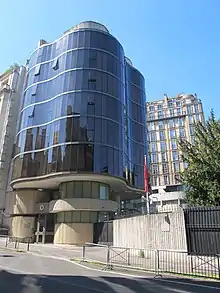Turks in France
Turks in France also called the Turkish-French community, French Turks or Franco-Turks (French: Turcs de France; Turkish: Fransa'daki Türkler) refers to the ethnic Turkish people who live in France. The majority of French Turks descend from the Republic of Turkey; however there has also been Turkish migration from other post-Ottoman countries including ethnic Turkish communities which have come to France from North Africa (especially Algeria and Tunisia), the Balkans (e.g. from Bulgaria, Greece, Kosovo, North Macedonia and Romania), the island of Cyprus, and more recently Iraq, Lebanon, and Syria. There has also been migration to France from the Turkish diaspora (i.e. from states outside former Ottoman territories, such as Morocco and Western Europe).
| Total population | |
|---|---|
| 1,000,000 (2010 estimate by Dr Jean-Gustave Hentz and Dr Michel Hasselmann)[1] More than 1,000,000 (2020 estimate)[2] | |
| Regions with significant populations | |
| Languages | |
| (Arabic spoken by Turkish Algerians and Turkish Tunisians; Bulgarian spoken by Turkish Bulgarians, etc.) | |
| Religion | |
| Predominantly Sunni Islam (including practising and non-practising) Minority Alevism, other religions, or irreligious |
History
Early Ottoman migration
The first Turks settled in France during the 16th and 17th century as galley slaves and merchants from the Ottoman Empire;[3][4] the historian Ina Baghdiantz McCabe has described Marseille as a "Turkish town" during this time.[5] According to Jean Marteilhe "…the Turks of Asia and Europe...of whom there are a great many in the galley of France, who have been made slaves by the Imperialists, and sold to the French to man their galleys… are generally well-made, fair in feature, wise in their conduct, zealous in the observance of their religion, honourable and charitable in the highest degree. I have seen them give away all the money they possessed to buy a bird in a cage that they might have the pleasure of giving it its liberty".[6]
Turkish migration from the Republic of Turkey
France signed a bilateral labour recruitment agreement with Turkey on 8 May 1965[7] because the number of entrants from other countries such as Italy, Spain and Portugal was not sufficient.[8] By 1975 there were 55,710 Turkish workers living in France,[8] this had almost quadrupled to 198,000 in 1999.[9] The majority of Turkish immigrants came from rural areas of Turkey, especially from central Anatolia.[10]
Whilst the majority of Turkish immigrants came during the recruitment agreement, many also came much earlier. For example, even in areas with fewer immigration waves, Cholet had an established Turkish community since 1945.[11]
Turkish migration from other post-Ottoman countries
Whilst the majority of French Turks originate from the modern borders of the Republic of Turkey, there are also significant Turkish-Algerian and Turkish-Tunisian communities which arrived in the France once the Ottoman rule ended with the French colonization of North Africa as well as some who arrived after the formation of the modern borders of Algeria and Tunisia.
Furthermore, there are also smaller numbers of Turkish communities which have arrived to France from the Balkans (e.g. Bulgarian Turks and Western Thrace Turks) whilst Turkish Cypriots have come from both the Republic of Cyprus and the Turkish Republic of Northern Cyprus. More recently, since the European migrant crisis started in 2014, Iraqi Turks and Syrian Turks have also come to France.
Demographics
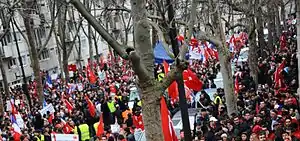
The majority of Turks are mainly concentrated in eastern France.[12] There is a strong Turkish presence in Île-de-France (especially in Paris), Nord-Pas-de-Calais (mainly in the cities of Calais, Lille, and Roubaix), Rhône-Alpes (especially in Lyon), Alsace (mainly in Strasbourg) and Lorraine.[13][14] There is also a large community in Marseille.[15]
The 10th arrondissement of Paris is steeped with Turkish culture and is often called "La Petite Turquie" (Little Turkey).[16]
In addition to living in the biggest French cities, there are also large Turkish communities in smaller towns and villages. Bischwiller, in Alsace, is often dubbed "Turkwiller" due to its large Turkish community.[17] The Turks also make up approximately 15% of the population in Châteaubriant (2014 est.)[18] and 17% of the population in Flers.[19]
Population

Official data on the total number of French Turks is not available because the French census only records statistics on the country of birth rather than one's ethnic affiliation. Numerous estimates since the 2010s placed the Turkish-French population at around 1 million,[1][20][21] or over 1 million.[22] By 2020 estimates have continued to suggest more than 1 million[2] to as much as 1.9 million French Turks.[23]
As early as 2002, Professor Remy Leveau and Professor Shireen T. Hunter said that official statistics on the Turkish community "may be too small" and estimated the number of Turks to be 500,000.[24] By 2014 Professor Pierre Vermeren reported in L'Express that the Turkish population was around 800,000.[25] However, an earlier report by Dr Jean-Gustave Hentz and Dr Michel Hasselmann in 2010 had already estimated that there was 1 million Turks living in France.[1] Similarly, Professor İzzet Er,[20] as well as the French-Armenian politician Garo Yalic (who is an advisor to Valerie Boyer),[26] also said that there was 1,000,000 Turks in France in 2011 and 2012 respectively.
More recently, there have been reports that the Franco-Turkish population exceeds one million, including in Le Petit Journal in 2019,[22] and Marianne in 2020.[2]
Some Turkish sources have suggested that the Turkish population in France was 1,900,000 in 2020.[23]
Birth rates
Although the birth rates among Turks living in France has declined over the years they remain substantially higher than the French population. In 1982, the average number of children for Turks was 5.2, compared with 1.8 for the French population. By 1990, the average number of births for Turks was 3.7 compared to 1.7 for the French population.[27]
Culture
Language
In 2000, Akıncı and Jisa found that Turkish is spoken exclusively at home by 77% of families, while 68% of children speak French to one another.[28] Turkish children are monolingual in the Turkish language until they start school at the age of 2 or 3; thus, they find themselves in everyday situations in which they have to speak French with their peers.[29] By the age of 10, most children become dominant in the French language.[30] Nonetheless, even for those who use French more than Turkish in their daily lives, numerous studies have shown that they still emphasize the importance of Turkish as the language of the family, particularly for raising children.[31] Thus, there is a high degree of language maintenance in the Turkish community; frequent holidays to Turkey, the easy access and use of Turkish media, and the density of social networks help maintain their language.[32]
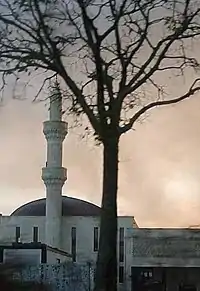
Religion
The majority of Turks adhere to Islam and focus on creating their own mosques and schools, most of which are tightly linked to Turkey. Thus, Turks worship their religion mainly with others within their community.[33] Due to Turkish immigrants having a strong link to the Turkish state and much less knowledge of the French language, compared to other Muslim immigrants who have emigrated from French-speaking countries, Turks tend to build mosques where sermons are given in Turkish rather than French or Arabic.[34]
The Turkish-Islamic Union for Religious Affairs (DİTİB), which is a branch of the Turkish state Bureau of Religious Affairs (the Diyanet),[34] promotes a "Turkish Islam" which is based upon a moderate, rational Islam of a secular state.[35] The Diyanet has organic links to the "Coordination Committee of Muslim Turks in France", or CCMTF, (French: Comité de coordination des musulmans turcs de France)[36] which brings under its umbrella a total of 210 mosques.[37] Its major competing network of mosques is run by the Millî Görüş movement (French: Communauté Islamique du Milli Görüş de France) which emphasizes the importance of solidarity of the community over integration into French society.[34] The Millî Görüş has an estimated 70 mosques in France.[34][37]
Integration
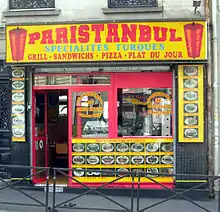
The Turkish community is considered to be the least integrated immigrant community in France,[13] largely due to their strong attachment to their country of origin.[38] However, there is increasing recognition by Turkish officials that without successful integration the immigrant community cannot lobby for the home country.[38] For example, in 2010, the Turkish Prime Minister Recep Tayyip Erdoğan stressed that assimilation is different from integration and urged the Turkish community in France to integrate by applying for French citizenship.[39]
Discrimination
Discrimination against Turks in French society is seen particularly within the labour market when they are looking for jobs. Given a choice between a Turkish and a French with the same qualifications, French employers tend not to choose the immigrant applicant.[40][41]
Organisations and associations
- Comité de coordination des musulmans turcs de France, the coordination committee for Turkish Muslims in France is linked to Turkey.[42]
- "Fransa Türk Federasyonu", the French Turks Federation.[43]
- "Migrations et cultures de Turquie" (ELELE), promote knowledge of Turkish immigration and helps to assist the integration of Turkish migrants into French society.[44]
- "Le Groupement des Entrepreneurs Franco-Turcs" (FATIAD), the leading business association created by Turks living in France.[45]
- Réseau Pro'Actif, A professional network created by second and third generations of Turks in France. It gathers graduates of the country's leading universities.
Notable people
Notable French Turks
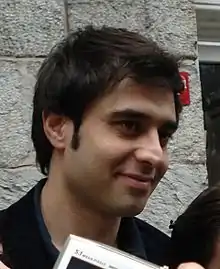
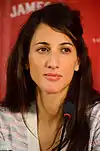
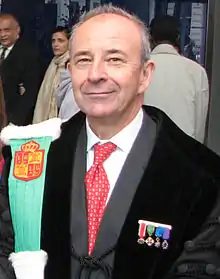
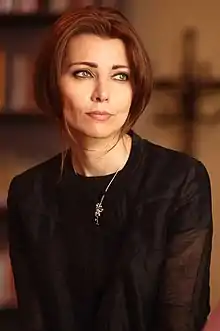
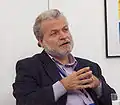
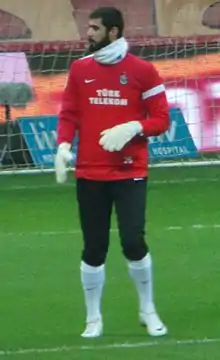

French Turks have contributed in many ways to the arts, academia, cinema, television, music and sports in both France and Turkey.
For example, the renowned photographer Gökşin Sipahioğlu, who founded the Paris-based photo agency Sipa Press, was dubbed "le Grand Turc" in the French media and was appointed the Knight of the Legion of Honour by president Jacques Chirac in 2007.[46]
Also in media, there are numerous notable French Turks in cinema; for example, Deniz Gamze Ergüven is a film director whose 2015 film Mustang won the Europa Cinemas Label Award at the Cannes Film Festival as well as four awards at the 41st César Awards.[47] On television, Anaïs Baydemir is a weather presenter for France 2 and France 3.[48] Furthermore, Muratt Atik[49] and Cansel Elçin[50] have both acted in French and Turkish film and television roles.
In music, the singer Gülseren represented Turkey at the Eurovision Song Contest 2005.[51] Meanwhile, in 2015 the singer Anne Sila participated in season 4 of The Voice : la plus belle voix.[52]
Notable Turkish-French academics include Dr Ipek Yalcin Christmann who is a neurobiologist in charge of research at the French National Centre for Scientific Research;[53] Dr Serdar Dalkılıç who founded the National Union of Hospital Practitioners (SNPAC) and who is the President of the Franco-Turkish Health Foundation;[54] Erol Gelenbe who is a Professor in Electrical and Electronic Engineering at Imperial College; Nilüfer Göle who is a Professor of Sociology at the École des Hautes Études en Sciences Sociales;[55] Doğan Kuban who is Professor of Ottoman Architecture and History at Istanbul Technical University;[56] Ronald Karel who is the only researcher in the world who has successfully demonstrated and proved the existence of ionized earthquake clouds;[57] Dr Halit Mirahmetoğlu who launch "Gökmen Aviation and Aerospace Training Center" (GUHEM) which is the very first center in Turkey devoted to the themes of space and aviation;[58] the historian Nora Şeni is a Professor at the Institut français de géopolitique;[59] and Semih Vaner who was founder and president of the "French Association for the Study of the Eastern Mediterranean and the Turkish-Iranian World" (AFEMOTI), Director of the "Study Group on Contemporary Turkey and Iran (ERTCI)", and Director of "Study notebooks on the Eastern Mediterranean and the Turkish-Iranian world" (CEMOTI).
Non-fiction Turkish-French writers include Elif Shafak who was awarded the Ordre des Arts et des Lettres in 2010;[60] the novelist Nedim Gürsel who teaches contemporary Turkish literature at the Sorbonne;[61] Seyhan Kurt who is a poet, writer, anthropologist and sociologist; and the novelist Kenizé Mourad who descends from the exiled Ottoman royal family and is of partial Turkish descent; her bestselling book Regards from the Dead Princess: Novel of a Life sold more than 3 million copies in France and tells the story of the end of the Ottoman Empire through the eyes of her mother Princess Selma.[62]
In fashion, the designer Ece Ege co-founded the Paris-based high fashion brand Dice Kayek with her sister Ayşe Ege; they won the prestigious Jameel Prize at the Victoria and Albert Museum in 2013.[63]
Most obvious are the large number of male Turkish-French football players, including Emre Akbaba, Aksel Aktas, Kubilay Aktaş, Mikail Albayrak, Fatih Atik, Numan Bostan, Umut Bozok, Ozkan Cetiner, İbrahim Dağaşan, Mustafa Durak, Mevlüt Erdinç, Ayhan Güçlü, Metehan Güçlü, Ender Günlü, Serdar Gürler, Selim Ilgaz, Burak Kardeş, Samed Kılıç, Özer Özdemir, Sinan Özkan, Hakan Özmert, Fatih Öztürk, Yusuf Sari, Atila Turan, Kendal Ucar, Sabahattin Usta, Serkan Yanık and Yakup Ramazan Zorlu. In addition, there are several notable female Turkish-French football players, including Selen Altunkulak and İpek Kaya.
In religious affairs, Ahmet Ogras became the first Turkish-French President of the French Council of the Muslim Faith in 2017.[64]
In politics, Agnès Evren was elected as a Member of the European Parliament in the 2019 election in France,[65] and in 2020 Metin Yavuz was elected the mayor of Valenton in Paris.[66]
Notable French Algerian-Turks
.jpg.webp)
.jpg.webp)
_by_Sandro_Halank%E2%80%93516.jpg.webp)
.jpg.webp)
Many French-Algerians with Turkish origins have contributed to the arts, sports and politics in France.
Notable writers include Mustapha Haciane who was born in Algeria into a Turkish family; he currently resides in Paris.[68] The Algerian-born French writer Leïla Sebbar is paternally of Turkish origin through her grandmother.[67]
In politics, Nafissa Sid-Cara, who was the first female minister to serve in the French Fifth Republic as well as the first ever Muslim woman to serve as a minister in a French government,[76] was born into a family of Turkish origin which had been established in Algeria.[77] Sid-Cara's brother, Chérif Sid Cara, was also a notable politician and doctor.[77] Other notable French politicians of Turkish-Algerian origin include the lawyer Kaddour Sator who was Deputy of Constantine in 1946,[78] as well as Mourad Kaouah[79] who served as the deputy of Algiers from 1958 to 1962 - being the only French Muslim deputy at the time.[80]
There are also several notable sportsman of Turkish-Algerian origin, including the former pole vaulter and Olympian Patrick Abada.[81] The football player Benjamin Stambouli,[69][70] and his father Henri Stambouli, are also of Turkish origin; their surname "Stambouli" means "from Istanbul" and is commonly used by Algerian-Turks who trace their roots back to the former Ottoman capital city.[82]
Numerous sources claim that the actress Isabelle Adjani is paternally of Turkish-Algerian origin.[71][72][73][74][75]
Notable French Tunisian-Turks
Notable Tunisian-Turks in France include the Paris-based artist Mourad Salem,[83][84] and fashion stylist Yasemin Tordjman, who is of Turkish origin through her paternal grandfather.[85]
Notable French Levantine Turks
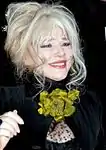
.jpg.webp)
In addition to the substantial number of contributions made by French citizens of Turkish origin who descend from Turkey and the Maghreb, there are also notable French Turks who have backgrounds from other former Ottoman territories.
For example, Beirut-born French author Amin Maalouf is of Turkish origin through his Turkish-Egyptian mother.[88] The Lebanese-born French poet and writer, Vénus Khoury-Ghata, is also of Turkish origin.[87][89] Her daughter, Yasmine Ghata, was born in France and is also a writer.[89][90] In addition, the Lebanese-born French businessman Emad Khashoggi, who initiated the Château Louis XIV development project in Louveciennes, is from the Turkish-Saudi Khashoggi family.
From Egypt, Cairo-born Nil Yalter is a contemporary feminist artist with both Turkish and French citizenship.[91][92]
There are also notable Syrian Turks in France; for example, the French singer, Armande Altaï, was born in Aleppo to a Turkish mother.[86] Another notable French singer of Turkish-Syrian origin is Mennel Ibtissem, who gained fame after being a contestant on The Voice France.[93]
Notable French people from Turkish diasporas
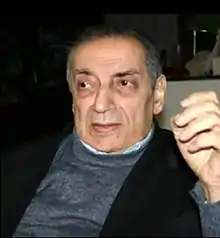

Some ethnic Turks living in France have also come from the Turkish diaspora communities (i.e. from countries that were not part of the former Ottoman Empire), especially Morocco but also from other countries with a large Turkish immigrant community.
The majority of French-Moroccans with Turkish roots are from the Turkish-Algerian diaspora and Turkish-Tunisian diaspora. For example, Leïla Chellabi is a Morocco-born writer whose father was an Turkish Algerian who obtained French citizenship.[96] Furthermore, the Moroccan-born French businessman Ali Bourequat is from a Turkish-Tunisian family.[94]
Other notable French people of Turkish origin from the diaspora includes the journalist Reha Kutlu-Hutin; she is from the Turkish American diaspora and is currently the President of 30 millions d'amis.[95]
See also
References
- Hentz, Jean-Gustave; Hasselmann, Michel (2010). "Transculturalité, religion, traditions autour de la mort en réanimation". Springer-Verlag France. doi:10.1007/978-2-287-99072-4_33. ISBN 978-2-287-99072-4.
La France d’aujourd’hui est une société multiculturelle et multiethnique riche de 4,9 millions de migrants représentant environ 8 % de la population du pays. L’immigration massive de populations du sud de l’Europe de culture catholique après la deuxième guerre mondiale a été suivie par l’arrivée de trois millions d’Africains du Nord, d’un million de Turcs et de contingents importants d’Afrique Noire et d’Asie qui ont implanté en France un islam majoritairement sunnite (Maghrébins et Africains de l’Ouest) mais aussi chiite (Pakistanais et Africains de l’Est).
- Gallard, Joseph; Nguyen, Julien (2020), "Il est temps que la France appelle à de véritables sanctions contre le jeu d'Erdogan", Marianne, retrieved 25 November 2020,
... et ce grâce à la nombreuse diaspora turque, en particulier en France et en Allemagne. Ils seraient environ un million dans l'Hexagone, si ce n’est plus...es raisons derrière ne sont pas difficiles à deviner : l’immense population turque en Allemagne, estimée par Merkel elle-même aux alentours de sept millions et qui ne manquerait pas de se faire entendre si l’Allemagne prenait des mesures allant à l’encontre de la Turquie.
- Morrison & Gardiner 1995, 190.
- Takeda 2011, 98.
- McCabe 2008, 18.
- Marteilhe 1867, 146.
- Akgündüz 2002, 61.
- Akgündüz 2002, 101.
- Al-Shahi & Lawless 2005, 13.
- Milewski & Hamel 2010, 618.
- La communauté turque s'ouvre aux Choletais, Ouest-France, 2018, retrieved 19 December 2020
- LeSaout & Kadri 2002, 87.
- Hargreaves 2007, 73.
- Nielsen, Akgonul & Alibasic 2009, 129.
- Bowen 2008, 147.
- Le Petit Journal. ""LA PETITE TURQUIE" - Balade dans le quartier turc de Paris". Archived from the original on 2014-05-30. Retrieved 2014-12-14.
- Le Point. "Alsace le ghetto turc". Retrieved 2014-12-14.
- La communauté turque veut dire qui elle est, Ouest-France, 2014, retrieved 19 December 2020
- " Pas d’Europe sans la Turquie " : Franco-Turcs ils iront voter sans passion, Ouest-France, 2019, retrieved 19 December 2020
- Fransa Diyanet İşleri Türk İslam Birliği. "2011 YILI DİTİB KADIN KOLLARI GENEL TOPLANTISI PARİS DİTİB'DE YAPILDI". Archived from the original on 7 January 2012. Retrieved 2012-02-15.
İzzet ER Hocamız konuşmasında katılımcıları selamladıktan sonra, Fransa’da resmi verilere göre, 550 bin Türk nüfusunun bulunduğunu, bu sayının gayrı resmi olarak 1 milyon civarında tahmin edildiğini söyledi.
- "Bretagne-Turquie. Le combat persévérant d'Ali Dere". Le Télégramme. 2013. Retrieved 24 December 2020.
Il y a près d'un million de Turcs en France, mais ni député, ni maire et très peu d'élus.
- Kerdat, Marianne (2019), " Donner une autre image de la Turquie à travers le cinéma ", Le Petit Journal, retrieved 22 November 2020,
En France, la population franco-turque a dépassé le million.
- Bedir, Akif (2020). "Kirli hesaplar". Haber7. Retrieved 15 December 2020.
Fransa’da yaşayan 1 milyon dokuz yüz bin Türk...
- Leveau, Remy; Hunter, Shireen (2002), "Islam in France", Islam, Europe's Second Religion: The New Social, Cultural, and Political Landscape, Greenwood Publishing Group, ISBN 0-275-97609-2,
This number may be too small, as the number of Turks in France approaches 500,000.
- Vermeren, Pierre (2014). "Face à l'islam de France, du déni à la paralysie". Retrieved 28 October 2020.
Depuis dix ans, ce chiffre est régulièrement ben brèche: les estimations hautes décrivent une France qui compterait 4 à 5 millions d'Algériens et descendants, autour de 3 millions de Marocains, 1 million de Tunisiens, 2 millions d'Africains du Sahel, 800 000 Turcs, etc.
- Nalci, Aris (2012), An Interview with Garo Yalic, Advisor to Valerie Boyer, Armenian Weekly, retrieved 28 October 2020,
there are also about a million French people of Turkish origin that will show their weight in the electoral balance.
- Al-Shahi & Lawless 2005, 27.
- Akıncı & Jisa 2000, 318.
- Crul 2011, 275.
- Akıncı, Jisa & Kern 2001, 190.
- Backus 2008, 695.
- Backus 2008, 694.
- Bowen 2009, 11.
- Bowen 2009, 60.
- Çitak 2010, 625.
- Çitak 2010, 620.
- Çitak 2010, 626.
- Çitak 2010, 627.
- Today's Zaman. "Erdoğan urges Turks in France to integrate, not assimilate". Archived from the original on 2012-03-08. Retrieved 2011-05-31.
- Crul 2007, 220.
- Peignard 2006, 8.
- Ministère des affaires étrangères et européennes. "The Muslim faith in France" (PDF). Retrieved 2009-01-23.
- Fransa Türk Federasyonu. "Ana Sayfa". Retrieved 2009-01-23.
- GEMMA. "GENDER & MIGRATION in FRANCE: "a brief overview"" (PDF). Archived from the original (PDF) on 2012-03-24. Retrieved 2009-01-23.
- Groupement des Entrepreneurs Franco-Turcs. "Accueil". Archived from the original on 2011-06-10. Retrieved 2011-05-26.
- "Goksin Sipahioglu: Acclaimed photojournalist who went on to found the Sipa agency". The Independent. Retrieved 9 January 2015.
- "Mustang movie channels female 'power'". BBC News. 2016. Retrieved 22 November 2020.
- "Anaïs Baydemir". Voici. Retrieved 22 November 2020.
- Maras, Alexandre (2016), Gala by Night : Clara Morgane et son mari fêtent les 14 ans du Pink Paradise, Gala, retrieved 22 November 2020
- EN OCTOBRE - De la littérature, du théâtre et... des bières !, Le Petit Journal, 2017, retrieved 22 November 2020
- MUSIQUE: Gülseren et Luis, un pont entre l'orient et l'occident.!, Le Petit Journal, 2009, retrieved 22 November 2020
- Anne Sila - The Voice 4, Gala, retrieved 19 December 2020,
Originaire de la Drôme, Anne Sila voit le jour le 5 mars 1990. Fille d’un médecin d’origine turque, elle grandit avec son petit frère à Valence.
- Ipek Yalcin Christmann, Centre national de la recherche scientifique, CNRS, retrieved 22 November 2020
- Emission "Hayata Dair", samedi 1er février à 20h03 sur Radio Made in Turkey, Turquie News, 2014, retrieved 22 November 2020
- Ankara assuming leadership for Turks in Europe, says sociologist Göle, Ahval News, 2018, retrieved 22 November 2020
- Doğan Kuban: Bizde babamın evidir, koruyayım kültürü yok, İstanbul da böyle gitti!, Hürriyet, 2016, retrieved 22 November 2020
- "Unlocking the mystery of 'Earthquake Clouds' - how they form and why - Are they accurate in prediction?". www.sott.net.
- Bursa, ville pionnière pour l’espace et l'aviation grâce au GUHEM, Le Petit Journal, 2020, retrieved 22 November 2020
- La Turquie, Radio France Internationale, 2013, retrieved 22 November 2020
- The Forty Rules of Love - review, The Guardian, 2014, retrieved 22 November 2020
- Nedim Gürsel, writer, France 24, 2009, retrieved 22 November 2020
- Kenize Mourad’s novel counters misperceptions of Eastern women, Anadolu Agency, 2014, retrieved 22 November 2020
- QUAND LA MODE RENCONTRE L'ART – Les créatrices franco-turques de Dice Kayek remportent le prestigieux prix Jameel, Le Petit Journal, 2013, retrieved 22 November 2020
- French Muslims urge Macron not to interfere in Islam, Al Jazeera, 2018, retrieved 22 November 2020
- Le Guay, Virginie (2019), Les Républicains : Agnès Evren, de la ZUP à Bruxelles, Paris Match, retrieved 28 November 2020
- Un Franco-Turc élu maire en région parisienne, Le Petit Journal, 2020, retrieved 22 November 2020
- Sebbar, Leïla (2010), Voyage en Algéries autour de ma chambre, Suite 15, retrieved 16 July 2017,
mon père et lui sont cousins germains par leurs mères, des sœurs Déramchi, vieilles familles citadines du Vieux Ténès d’origine turque
- Déjeux, Jean (1984), Dictionnaire des Auteurs Maghrébins de Langue Française, KARTHALA Editions, p. 121, ISBN 2-86537-085-2,
HACIANE, Mustapha Né en 1935 à Rouiba dans une famille d'origine turque. A 17 ans, il écrit au lycée des poèmes engagés...Réside à Paris.
. - Two more suitors to Stambouli on Fenerbahçe's list!, News1, 2020, retrieved 9 September 2020,
Benjamin Stambouli's great-grandfather was a Turk who emigrated to Algeria during the Ottoman period. In fact, the meaning of the surname Stambouli is “from Istanbul”
. - Sarigul, Emre (2014), Tottenham midfielder looking forward to visit city of his forefathers, retrieved 23 November 2020,
Stambouli will visit the country of his forefathers. Despite being born in France, his family are descendants of Turkish Algerians. The surname Stambouli is of Turkish origin, his family name derives from the city of Istanbul and is a common surname amongst the Turkish-Algerian community which is estimated between 600,000-2 million.
. - Oscherwitz, Dayna; Higgins, MaryEllen (2009), The A to Z of French Cinema, Scarecrow Press, p. 16, ISBN 081087038X,
ADJANI, ISABELLE (1955-). Actress and producer. Isabelle Yasemin Adjani was born in Gennevilliers, Frence, the daughter of a German mother and an Algerian-Turkish father.
- Katz, Ephraim; Nolen, Ronald Dean (2013), The Film Encyclopedia 7e: The Complete Guide to Film and the Film Industry, Harper Collins, p. 1948, ISBN 0062277111,
Adjani, Isabelle. Actress. b. June 27, 1955, Paris, to an Algerian father of Turkish ancestry and a German mother.
- Verlant, Gilles; Mikaïloff, Pierre (2011), Le Dictionnaire des années 80, Larousse, p. 14, ISBN 2035861500,
Adjani(Isabelle) Née à Paris le 27 juin 1955, d'un père algérien d'origine turque et d'une mère allemande, Isabelle Adjani grandit dans la banlieue nordouest de Paris, à Gennevilliers.
- Auzias, Dominique; Labourdette, Jean-Paul (2005), Petit Futé Hauts-de-Seine, Nouvelles Editions de l'Université, p. 35, ISBN 2746913518,
Isabelle Adjani (1955). Isabelle Yasmine Adjani est née le 27 juin 1955 à Paris d'une mère allemande et d'un père algérien d'origine turque.
- Thompson, Chantal; Phillips, Elaine (2012), Cengage Advantage Books: Mais Oui! - Volume 1, Cengage Learning, p. 13, ISBN 1111835829,
Isabelle ADJANI BIOGRAPHIE Née Isabelle Yasmine Adjani, le 27 juin 1955, Gennevilliers, France Père algérien d'origine turque, mère allemande
- Goodwin, Stefan (2009), Africa in Europe: Interdependencies, relocations, and globalization, Lexington Books, p. 274, ISBN 0739127667.
- Forzy, Guy (2002), Ça aussi – c'était De Gaulle, Volume 2, Muller édition, p. 134, ISBN 2904255494,
La secrétaire d'Etat musulmane Nafissa Sidkara, d'une vieille famille d'origine turque établie en Algérie, et caution involontaire, comme son frère le Docteur Sid Cara lui aussi membre du gouvernement français...
. - Malika Rahal (2010), Ali Boumendjel, 1919-1957: une affaire française, une histoire algérienne, Vol 5, Belles lettres, p. 97,
Maître Kaddour Sator est, comme lui, très proche de Ferhat Abbas au sein de l'UDMA : il écrit dans La République algérienne mais appartient plutôt à la génération d'Ahmed, et est issu d'une des grandes familles algéroise d'origine turque.
- Spiaggia, Josette (2012), J'ai six ans: et je ne veux avoir que six ans, Editions du Félibre Laforêt, p. 104, ISBN 2953100997,
Mourad Kaoua (par la suite député d'Alger de 1958 à 1962) d'origine turque...
. - Bouyarden, Salima (2013), "Political participation of European Muslims in France and the United Kingdom", in Nielsen, Jorgen (ed.), Muslim Political Participation in Europe, Edinburgh University Press, p. 106, ISBN 0748677534
- Afrique-Asie, Issues 178-190: Sports, Société d'Éditions Afrique, Asie, Amérique Latine, 1979, p. 414,
Les Jeux méditerranéens vont s'ouvrir à Alger, quand on apprend que le perchiste français Patrick Abada a émis le souhait de ... La vérité est pourtant toute simple : Abada est d'une vieille famille algéroise (d'origine turque) dont de ...
. - Parzymies, Anna (1985), Anthroponymie Algérienne: Noms de Famille Modernes d'origine Turque, Éditions scientifiques de Pologne, ISBN 83-01-03434-3.
- Royal Borough of Kensington and Chelsea. "Sultans Are No Sultans: Mourad Salem". Retrieved 2013-10-13.
- Cornucopia. "Mourad Salem: Sultans are no sultans". Retrieved 2013-10-13.
- Hurriyet. "Umarım yakında bütün Arap kadınları Tunuslularla aynı haklara sahip olur". Retrieved 21 November 2020.
Evlenmeden önceki soyadınız ‘Torgeman’ yani ‘tercüman’. Aileniz Türk asıllı mı? - Baba tarafından büyükbabam Türk kökenli. 1700’li yıllarda Osmanlı İmparatorluğu ordusunda yüksek rütbeli bir asker olarak görev almış ve Tunus’a gönderilmiş. Esas soyadı Kodja’ymış (Koca). Tunus, beylik hizmetine girdikten sonra Türkçe ve Arapça konuştuğu için kendisine tercümanlık görevi verilmiş, bu yüzden de ‘Torgeman’ (Tercüman) soyadına geçmiş.
- Armande Altaï : » L'occident maintient l'Afrique dans la pauvreté, Je suis la fille d'un officier français et d'une mère turque., 2013, retrieved 19 December 2020
- YASMINE GHATA, Schaffner Press,
Ms. Ghata is the daughter of the renowned Turkish-Lebanese poet, Vénus Khoury-Ghata.
- Esposito, Claudia (2013), "Of Chronological Others and Alternative Histories: Amin Maalouf and Fawzi Mellah", The Narrative Mediterranean: Beyond France and the Maghreb, Lexington Books, p. 36, ISBN 0739168223,
born into a culturally composite family - his mother was Egyptian of Turkish origin, his father a Greek Catholic in 1949 in Lebanon...
- Ghata, Yasmine (2019), "For A Long Time, Afraid Of The Night: A Novel", Beshara Magazine, Schaffner Press, ISBN 194315676X,
Ms. Ghata is the daughter of the renowned Turkish-Lebanese poet, Vénus Khoury-Ghata.
- Julien, Par Bisson (2007), Yasmine Ghata: La romancière Yasmine Ghata tisse une belle histoire sur l'hérédité et ses conséquences, L'Express, retrieved 19 December 2020,
C'est décidément une affaire de famille. Révélée en 2004 avec La nuit des calligraphes, un premier roman plein de délicatesse où elle évoquait le souvenir de sa grand-mère paternelle, artiste turque portée sur les arabesques, Yasmine Ghata, fille de la romancière et poète Vénus Khoury-Ghata, prouvait par là même que le talent pouvait être héréditaire.
- "Politics of Writing Art Histories in Turkey: Nil Yalter and The Round House". University of Leeds. 2017. Retrieved 24 September 2017.
- Yücel, Derya (2013). Nil Yalter. Istanbul / Berlin: Revolver. ISBN 9783868953305.
- Mennel Ibtissem moves 'Voice France' judges with Arabic take of Leonard Cohen's 'Hallelujah', The National, 2018, archived from the original on 19 June 2018, retrieved 19 June 2018,
Born to a Syrian-Turkish father and Moroccan-Algerian mother,
- "The Bourequat brothers, arrested in 1973 to survive the Tazmamart secret prison". Yabiladi. 2018. Retrieved 2018-12-23.
Their father was a French-Tunisian national of Turkish descent, who left Tunisia for Morocco.
- David, Samantha (2017), Holidays used as excuse to dump pets, The Connexion, retrieved 23 December 2020,
TBorn in the US, Ms Hutin spent much of her childhood travelling with her Turkish diplomat parents.
- Chellabi, Leïla (2008), Autoscan: Autobiographie d’une intériorité, LCD Médiation, p. 237, ISBN 290953975X,
Mon père, né Algérien d'origine turque, a quitté l'Algérie pour le Maroc où il a fait sa vie après être devenu, par choix, français. Mais à chaque démarche on le croit d'abord marocain puis on sait qu'il est d'origine algérienne et turque, cela se complique.
.
Bibliography
- Akgönül, Samim (2009), "Turks of France: Religion, Identity and Europeanness", in Küçükcan, Talip; Güngör, Veyis (eds.), Turks in Europe: Culture, Identity, Integration (PDF), Turkevi Research Centre, ISBN 90-77814-13-2.
- Akgündüz, Ahmet (2008), Labour migration from Turkey to Western Europe, 1960–1974: A multidisciplinary analysis, Ashgate Publishing, ISBN 0-7546-7390-1
- Akıncı, Mehmet-Ali; Jisa, Harriet (2000), "Development of Turkish clause linkage in the narrative texts of Turkish-French bilingual children in France", in Göksel, Aslı; Kerslake, Celia (eds.), Studies on Turkish and Turkic languages, Otto Harrassowitz Verlag, ISBN 3-447-04293-1
- Akıncı, Mehmet-Ali; Jisa, Harriet; Kern, Sophie (2001), "Influence of L1 Turkish on L2 French narratives", in Strömqvist, Sven (ed.), Narrative development in a multilingual context, John Benjamins Publishing, ISBN 90-272-4134-1
- Al-Shahi, Ahmed; Lawless, Richard I. (2005), Middle East and North African immigrants in Europe, Routledge, ISBN 0-415-34830-7
- Backus, Ad (2008), "Turkish as an Immigrant Language in Europe", in Bhatia, Tej K. (ed.), The Handbook of Bilingualism, Wiley-Blackwell, ISBN 0-631-22735-0.
- Bowen, John Richard (2008), Why the French Don't Like Headscarves: Islam, the State, and Public Space, Princeton University Press, ISBN 0-691-13839-7
- Bowen, John Richard (2009), Can Islam be French?: pluralism and pragmatism in a secularist state, Princeton University Press, ISBN 0-691-13283-6
- Çitak, Zana (2010), "Between 'Turkish Islam' and 'French Islam': The Role of the Diyanet in the Conseil Français du Culte Musulman", Journal of Ethnic and Migration Studies, Routledge, 36 (4): 619–634, doi:10.1080/13691830903421797, hdl:11511/35102
- Crul, Maurice (2007), "The Integration of Immigrant Youth", in Suárez-Orozco, Marcelo M. (ed.), Learning in the global era: international perspectives on globalization and education, University of California Press, ISBN 0-520-25436-8
- Crul, Maurice (2011), "How Do Educational Systems Integrate? Integration of Second-Generation Turks in Germany, France, the Netherlands, and Austria", in Alba, Richard; Waters, Mary C. (eds.), The Next Generation: Immigrant Youth in a Comparative Perspective, NYU Press, ISBN 0-8147-0743-2
- Fadlouallah, Abdellatif (1994), "Migration flows from the South to western countries", in De Azevedo, Raimondo Cagiano (ed.), Migration and Development Co-operation, Council of Europe, ISBN 92-871-2611-9.
- Hargreaves, Alec G. (2007), Multi-ethnic France: immigration, politics, culture and society, Taylor & Francis, ISBN 0-415-39782-0
- Hunter, Shireen (2002), Islam, Europe's second religion: the new social, cultural, and political landscape, Greenwood Publishing Group, ISBN 0-275-97609-2
- Kastoryano, Riva (2002), Negotiating identities: states and immigrants in France and Germany, Princeton University Press, ISBN 0-691-01015-3
- Kirszbaum, Thomas; Brinbaum, Yaël; Simon, Patrick; Gezer, Esin (2009), "The Children of Immigrants in France: The Emergence of a Second Generation" (PDF), Innocenti Working Paper 2009–13, UNICEF Innocenti Research Centre, ISSN 1014-7837
- LeSaout, Didier; Kadri, Aïssa (2002), "Immigration policies and education in France", in Pitkänen, Pirkko; Kalekin-Fishman, Devorah; Verma, Gajendra K. (eds.), Education and immigration: settlement policies and current challenges, Routledge, ISBN 0-415-27821-X
- Marteilhe, Jean (1867), The Huguenot galley-slave: being the autobiography of a French Protestant condemned to the galleys for the sake of his religion, Leypoldt & Holt.
- McCabe, Ina Baghdiantz (2008), Orientalism in early modern France: Eurasian trade, exoticism, and the Ancien Régime, Berg, ISBN 1-84520-374-7
- Milewski, Nadja; Hamel, Christelle (2010), "Union Formation and Partner Choice in a Transnational Context: The Case of Descendants of Turkish Immigrants in France", International Migration Review, Center for Migration Studies of New York, 44 (3): 615–658, doi:10.1111/j.1747-7379.2010.00820.x
- Morrison, John; Gardiner, Robert (1995), The Age of the Galley: Mediterranean oared vessels since pre-classical times, Conway, ISBN 0-85177-955-7
- Nielsen, Jørgen S.; Akgonul, Samim; Alibasic, Ahmet (2009), Yearbook of Muslims in Europe, BRILL, ISBN 90-04-17505-9
- Organisation for Economic Co-operation and Development (2008), International Migration Outlook: SOPEMI 2008, OECD Publishing, ISBN 92-64-04565-1
- Peignard, Emmanuel (2006), "Immigration in France", in Lynch, Jean B. (ed.), France in Focus: Immigration Policies, Foreign Policy, and U.S. Relations, Nova Publishers, ISBN 1-59454-935-4
- Rollan, Françoise; Sourou, Benoît (2006), Les migrants turcs de France: entre repli et ouverture, Maison des Sciences de l'Homme d'Aquitaine, ISBN 2-85892-330-2
- Takeda, Junko Thérèse (2011), Between Crown and Commerce: Marseille and the Early Modern Mediterranean, JHU Press, ISBN 0-8018-9982-6
Further reading
- Böcker, A. (1996), “Refugee and Asylum-Seeking Migration from Turkey to Europe” Boðaziçi Journal Vol. 10, Nos. 1–2.
- Cahiers d'Etudes sur la Mediterranée orientale et le Monde Turco-iranien (1992), special issue on Turkish immigration in Germany and France, Paris: Centre d'Etude des Relations internationales, n°13.
- Cahiers d'Etudes sur la Mediterranée orientale et le Monde Turco-iranien (1996), special issue on Turkish migrant women in Europe, Paris: Centre d'Etude des Relations internationales, n°21.
- Les Annales de l'Autre Islam (1995), special issue on Turkish diaspora in the World, Paris: Institut national des Langues et des Civilisations orientales, n°3.
External links
| Wikimedia Commons has media related to Turks in France. |
